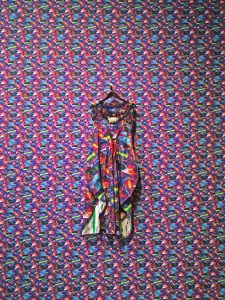From April 21st to August 5th, the Seattle Art Museum will be running an exhibition of Jono Vaughan’s multidisciplinary work Project 42. Vaughan seeks to depict the impact of violence on transgender people and at the same time, memorialize their lives and provoke discussion as well as attention.
Based on the concept of rebirth through dance, the number 42 represents the short life expectancy of transgender people in the United States, ranging from 25 to 42 years. It is also the total number of works that will be showcased for the entire project. Launched in June 2013, Project 42 will continue to honor these lost lives until all separate memorial garments and collaborations have been created.
The exhibition at Seattle Art Museum takes over one gallery, which features three different pieces of garments that belong to the ongoing 42 works. Each of them represents the life and death of an individual transgender person who was murdered: Myra Ical, Deja Jones, and Lorena Escalera Xtravaganza.
To recreate the location of each murder, Vaughan takes a screenshot of the murder location with Google Earth and then digitally manipulates the image in Photoshop to create a colorful and abstract pattern. This pattern is turned into fabric through digital painting, and the fabric is sewn into memorial garments that are sized upon collaborators’ measurements.


In Seattle Art Museum’s exhibition, two of the three garments are hung on opposite walls. The wallpaper behind each work is of the same pattern as the dress. The third one is a larger and more sculptural garment that is displayed at the center of the gallery, with a 34-foot train lifting off from the dress and draping down from the ceiling.
The style of garments is inspired by the life and history of the individuals. The patterns often symbolically reference the age and accomplishments of the victim, integrating numbers and text that were significant in the victim’s life. This act symbolically gives life into the garments, and consequently offers some kind of potential experience to the short lives of the deceased victims.
Project 42 stands out as an important exhibition to educate the general audience about three topics that we usually avoid discussing: Death, violence and transgender people. As the project will continue until it features all 42 garments, Project 42 will remain a promising exhibition in the years to come.
Jono Vaughan is the 2017 Betty Bowen Award winner with an unrestricted cash award of $15,000. Vaughan teaches Fine Art at Bellevue College and works in Seattle. Since 2009, Vaughan has been producing autobiographical works focusing on hair and its role in gender and social identity ina variety of media including drawing, painting, printmaking, video, and performance. These works have been featured in New American Paintings and have been exhibited in a number of solo and group exhibitions. Currently Vaughan is exploring projects outside of the autobiographical and within the larger transgender/cisgender community through collaborations with performance artists in a number of countries.










Comments are closed.